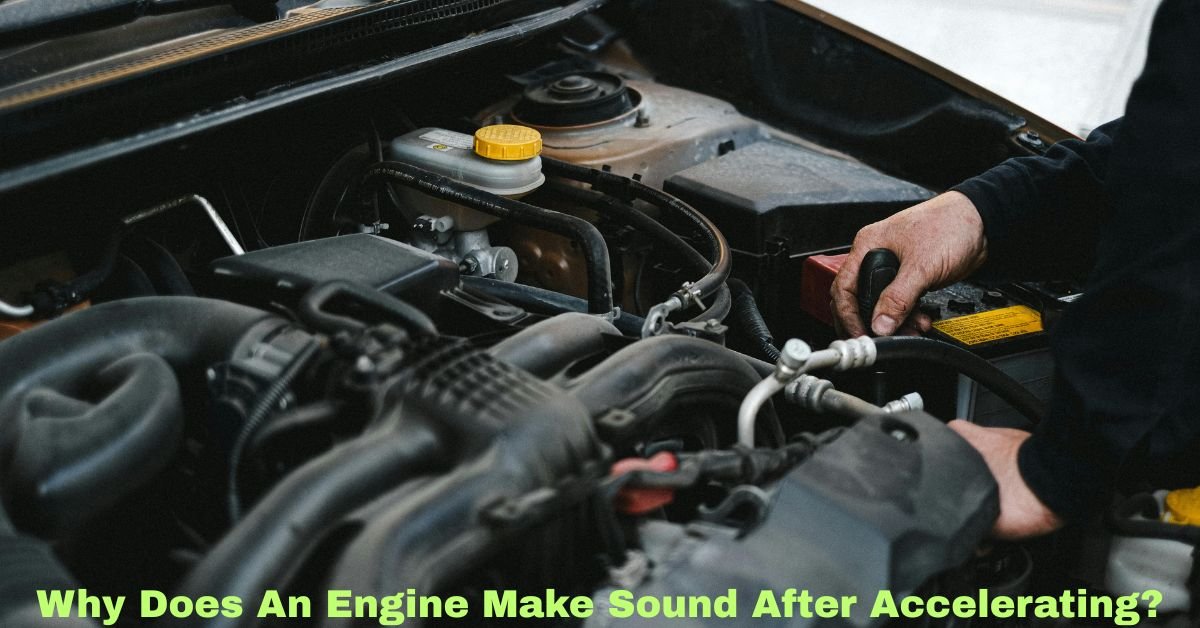If you’ve ever stepped on the gas pedal and heard your car engine roar to life—or noticed a lingering sound even after you’ve eased off the throttle—you’re not alone. For many drivers, engine sounds are a normal part of the driving experience. But why does your engine make that distinctive sound after you accelerate? Is it just the motor doing its job, or is something more happening under the hood?
Let’s explore what causes those post-acceleration sounds and what they mean for your vehicle’s health and performance.
Why Does an Engine Make Sound After Accelerating?
1. The Basics of Engine Sound
Every internal combustion engine creates sound. The engine is essentially a series of small, controlled explosions happening many times per second. When you press the accelerator, more fuel and air are fed into the engine, and the combustion process intensifies. This results in a louder sound, which is most noticeable during acceleration.
However, the sound you hear after you’ve accelerated—when you’re no longer pressing the gas—can come from several other components and processes in the vehicle.
2. Exhaust System and Backpressure
One of the most common reasons for sound after acceleration is the exhaust system. When you accelerate, gases are rapidly expelled from the engine through the exhaust. The exhaust system keeps controlling the remaining gasses when you let up of the throttle. This may cause:
- Backfiring or popping sounds (especially in performance cars or cars with modified exhaust systems)
- Rumbling or growling as exhaust gases continue to exit
- Vibration sounds if there are any loose exhaust components or heat shields
These sounds are typically harmless unless they’re sudden or very loud, which could indicate an issue like a leak or a damaged muffler.
3. Engine Cooling Fans
After heavy acceleration, the engine’s temperature rises. To prevent overheating, cooling fans may kick in—especially in hot weather or after a long drive. These fans can be surprisingly loud and continue running for a short period after you’ve stopped accelerating or even turned off the engine.
This is a normal function and helps maintain engine health, but if the fans sound unusually noisy or stay on for too long, it could suggest a cooling system problem.
4. Turbo Lag or Compressor Surge (in Turbocharged Cars)
If your car has a turbocharger, you might hear specific sounds after acceleration:
- The time lag between accelerating and the turbo catching up is known as turbo lag. When you lift off the throttle, the pressurized air needs to go somewhere, often resulting in a “whoosh” or “pssh” sound from the blow-off valve.
- In some cases, you might hear compressor surge, a fluttering sound caused when air flows backward through the turbo. While cool-sounding, it can potentially damage the turbo if it happens frequently.
Must Read: Which Transmission Is In 2006 Chevy Silverado 4.8 Engine?

5. Transmission and Drivetrain Noises
Occasionally, the transmission or drivetrain parts are the source of the noise rather than the engine itself. After acceleration, especially during deceleration or downshifting, you might hear:
- A whining sound, which can point to worn transmission parts
- A clunk if motor mounts or suspension components are loose
- A hum or growl from the differential or wheel bearings
If these noises are regular or growing louder, it’s a good idea to have your vehicle inspected.
6. Engine Knock or Detonation
In some cases, a knocking or pinging sound can be heard shortly after acceleration. This is typically caused by pre-ignition or detonation—when the air-fuel mixture ignites prematurely. It’s more common in older vehicles or cars using lower-octane fuel than recommended.
Persistent engine knocking can lead to serious damage, so if you notice this sound, consult a mechanic as soon as possible.
7. Is It Normal?
Some noise after acceleration is perfectly normal, especially in performance vehicles or cars with sport-tuned exhaust systems. However, if the noise is new, louder than usual, or accompanied by performance issues (like power loss, vibration, or dashboard warnings), it’s worth investigating.
Conclusion
The sounds your engine makes after accelerating can tell you a lot about what’s going on under the hood. From the normal hum of the exhaust system to potential signs of mechanical wear, being attentive to these noises is a key part of responsible car ownership.
If you’re ever unsure whether a noise is normal, trust your instincts and get it checked. In many cases, early detection can prevent costly repairs—and keep your engine running smoothly for years to come.
